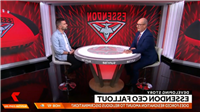I’ve lost faith that Australia knows how to discuss religion

I found myself yelling at Kochie on Thursday morning.
Rest assured, I love breakfast television as much as the next person, but I found myself confused when TV’s modern-day messiah told the pastor of City on a Hill, the church at the centre of the Andrew Thorburn Essendon saga, that he and the 2.18 billion other followers of the Bible should simply keep up with the times.
“It’s a 2000-year-old document,” he told pastor Guy Mason. “It was a different time, it was a different era.”
No room for reasoning: when Mason attempted to give an explanation for why he believed the Bible was not simply a product of its time but the true and beautiful word of a living God, the pastor was met with a classic Australian putdown: “I’m not gonna have a battle of the Bible.”
Despite Kochie’s wishes, it appears that’s exactly the battle we’re having. Debates about theological interpretations of sexual ethics and abortion have plastered our newspapers for days. And we’re terribly lacking in the armour needed for a proper discussion.
Never before have Australians known so little about the foundational text of Australia’s biggest religion – and even less about the Koran – and never before, it seems, have we had such strong opinions on its utter irrelevance to life and society.
I don’t want to suggest the issues raised by the saga are not incredibly personal or not acknowledge that the way they have often been communicated by faith groups has been hurtful – but I do want to suggest that our society’s understanding of religion simply isn’t good enough to properly understand how people of faith think.
I go to an inner-city Anglican church – a mainstream evangelical church not dissimilar to City on a Hill, where the pastors wear jeans, we sing songs written this century, and sexual minorities of all genders and backgrounds have found a home. Among my close friends, colleagues and family are people of a variety of different faiths, sexualities and beliefs. I see the real beauty of a world in which people can choose how to live.
For me and other people of faith, it’s been an uncomfortable week.
Across the country, we have been watching the week’s chaos unfold and wondering: “could I be next?” It sounds absurd when you say it out loud, but the discomfort in religious communities is palpable.
I fear the question stems from a growing intolerance of those who see the world through a religious lens. But I want to believe it is a lack of understanding – one that has been a long time coming.
Millennials appear to be the first Australians in generations who didn’t grow up either going to Sunday school, hearing Bible stories read, or having some religious education within school (and that’s before we look at our understanding of other faiths beyond Christianity).
Not doing any of those things works fine – until the message of a religion, Christianity or otherwise, clashes with a contemporary view of the world. When that happens, as it has this week, a battle breaks out between the rich and complex theology of many faiths stretching back thousands of years, and our admittedly shallow modern theology (“you do you,” if it were to be summed up in a phrase).
Could you tell me what Christians say about how you get to heaven? Or what Muslims believe about the nature of God?
These questions matter. Because even if you’re not religious, there’s a very high likelihood a colleague, neighbour or family member will be: more than 50 per cent of Australians identified as religious in some way at the last census, and it’s estimated that in the last month up to 2.1 million people, close to one in 10 Australians, attended a church service – and that’s before adding up the growing numbers of attendees at mosques, synagogues and temples.
Grasping how people of faith see the world is genuinely hard. For starters, here’s something of a Biblical view: we’re people created purposely by a wholly good creator, and despite our rejection of his love we are offered deep intimacy with him through the work of his son Jesus Christ, and we now live in love as we wait for a world to be once again made perfect.
Our society may not be as religiously literate as it once was, but faith is still foundational to the lives and stories of millions across our country. It’s not good enough for us – especially political leaders – to demand people of faith join the unrelenting contemporary march of progress. We need to understand faith and how people of it think. Ask us about it. You might find yourself reassessing the battlefield.
The Opinion newsletter is a weekly wrap of views that will challenge, champion and inform your own. Sign up here.
Most Viewed in National
From our partners
Source: Read Full Article